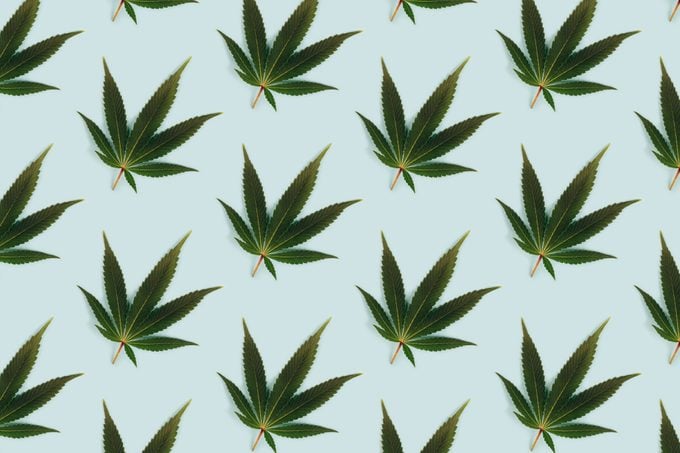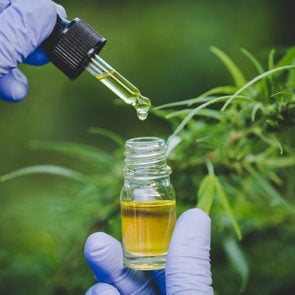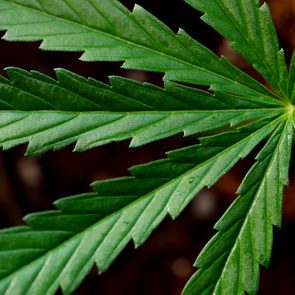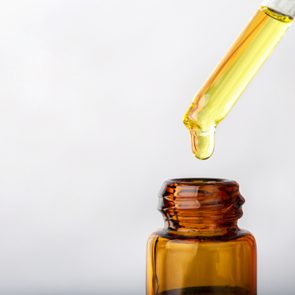This Is What CBD Isolate Is and How to Use It
Updated: Apr. 01, 2021
CBD isolate, which doesn't contain THC, is a more pure form of CBD, but it may not offer the same benefits as full- or broad-spectrum CBD products.
Understanding CBD
Curious about cannabidiol (CBD)? Maybe you’re thinking about giving it a try, like using CBD for anxiety and sleep. Or maybe you’re interested in using a topical CBD cream for pain or arthritis relief.
“There is in fact a reason to believe CBD could be helpful,” says Roger S. McIntyre, MD, a professor of psychiatry and pharmacology at the University of Toronto. “This is not some type of quackery or nonsense.” Nevertheless, he says, there isn’t enough data on safety and effectiveness in humans to recommend CBD for patients with serious mental illness or for “wellness” in healthy people.
While Dr. McIntyre does not recommend CBD to his patients, he acknowledges that many of them use it anyhow. (Here’s how one woman used CBD oil for insomnia.) He asks those who do use cannabis-based medicines to let him know, so he can look out for potential interactions with other medications.
For those who want to try CBD but don’t want to risk ingesting trace amounts of delta-9-tetrahydrocannabinol (THC)—the main mind-altering chemical found in marijuana—CBD isolate may be the best option.
Here’s what you need to know about CBD isolate, including benefits, risks, how to make it, use it, and where to buy it.

What is CBD isolate?
CBD isolate is a compound that comes from the plant Cannabis sativa. Because of the way manufacturers extract (or isolate) the CBD from all of the other components of the plant, it’s the purest form of CBD.
It does not have a particular smell or taste and can come in different forms, including CBD isolate crystal, CBD isolate powder, and CBD isolate oil.
As the name suggests, CBD isolate crystal is CBD in pure, crystalline form. It can be mixed into liquids and even vaping pipes. With CBD isolate powder, the crystal is ground into a powder, making it easier to ingest.
Indeed, the powder form is the easiest to ingest. It can be mixed into edibles like gummies or liquids like tea and juice. CBD isolate can also be mixed with carrier oils to make CBD oil. (More on how to create your own CBD isolate oils and products later.)
Benefits of CBD isolate
CBD has been used to alleviate health ailments like anxiety, pain, inflammatory conditions, epilepsy, and cancer symptoms. But how well or if it actually works for all of these indications has yet to be determined. (A CBD oil-based drug, Epidiolex, was approved by the Food and Drug Administration in 2018 for the treatment of seizures in a handful of rare types of epilepsy.)
Evidence of CBD’s benefits in humans still lags behind promising findings from lab and animal studies, experts agree.
“The scientific evidence doesn’t seem to be as robust and as compelling at this stage as the enthusiasm for it in the population seems to be,” Dr. McIntyre says.
The entourage effect
Products made with CBD isolate are the purest CBD products available. That’s because they don’t contain additional cannabinoids or any of the other compounds, like terpenes and flavonoids, found in the cannabis plant.
Some experts argue that products that do include other cannabis components—known as full- or broad-spectrum CBD—are more effective than those with CBD only, thanks to what’s called the “entourage effect.” This theory holds that some substances found in cannabis—including CBD and THC—have synergistic effects.
However, a study published in 2019 in Cannabis and Cannabinoid Research finds an “absence of entourage.”
Researchers note that when terpenes were added to THC, there were no changes in CB1 and CB2 cannabinoid receptors—a part of the naturally occurring human endocannabinoid system which is responsible for regulating and balancing body function like immune response and appetite and metabolism. More research is needed to determine how exactly the entourage effect works.
Side effects of CBD isolate
CBD isolate is relatively low risk compared to cannabis products that contain THC. There are, however, side effects of CBD isolate. Those include appetite and weight fluctuations, diarrhea, fatigue, insomnia, and irritability, according to the U.S. Food and Drug Administration (FDA).
When it comes to dosing, there’s little information on how much people should take since the FDA has approved only the one CBD product for epilepsy. As always, consult a doctor to determine the safety of any CBD product and an effective dosage—especially if you’re taking other over-the-counter or prescription meds.
Differences between CBD oil and isolate
CBD oil is made by extracting cannabinoids, terpenes, and other components from cannabis plants. CBD oil and other products that contain all of these components in addition to CBD (including THC), are called full-spectrum products.
Whole-spectrum products have been processed to remove THC, but leave other cannabinoids and terpenes behind. Further processing to remove everything but the CBD produces CBD isolate, which can be suspended in an oil as well. (Find out if CBD gets you high or will make you fail a drug test.)
CBD isolate vs. full-spectrum
CBD products can be full-spectrum, meaning they contain other cannabinoids and terpenes found in cannabis plants. If full-spectrum products are made from hemp—strains of cannabis that contain no more than 0.3 percent THC—their THC content is likely minimal. Full-spectrum CBD products derived from marijuana with a higher THC content may have higher amounts. (Don’t miss the key differences of CBD oil vs. hemp oil.)
Growing higher-THC cannabis plants—aka marijuana—remains illegal at the federal level. But more and more states are permitting the cultivation and production of higher-THC cannabis for medicinal and recreational use.
Broad-spectrum CBD products are full-spectrum products with the THC removed. But similar caveats apply, because you still might be exposed to trace amounts of THC.
How to make CBD isolate
The first step is to extract CBD from a cannabis plant, which could be either marijuana or hemp (but usually hemp, due to its lower THC level). Tiny hair-like projections on the leaves, flowers, and stems of the plant, known as trichomes, are the richest source of CBD.
Cannabis plants grow several types of trichomes, tiny factories that produce cannabinoids, terpenes, and more to shield the plant from attack by insects, animals, and even damage from ultraviolet rays.
Supercritical carbon dioxide extraction is the safest—and most expensive—way to extract CBD and other substances from plant material. This method doesn’t leave toxic residues behind. But it’s not something most people should try at home. This is a high-tech method requiring expensive equipment and considerable scientific expertise.
The waxy gold oil harvested by this method—or any other extraction approach—must undergo additional refinement in order to produce CBD isolate. The extract may be filtered and then “winterized”—soaked in alcohol and frozen—to remove remaining unwanted material.
How to use CBD isolate
As previously mentioned, CBD crystal isolates can also be smoked or vaped. CBD isolate powder can be added to food and drinks. And CBD isolate oils are also available.
You can also make your own by adding CBD isolate to what’s known as a “carrier oil.” Many different types of oils make good carriers for CBD, including olive oil and hemp seed oil.
Oils made from medium-chain triglycerides—known as MCT oil, and often made using coconut oil—are a popular choice. You can even get CBD isolate with terpenes added back in.
Where to buy CBD isolate
Brick-and-mortar specialty CBD stores in states where CBD is legal sell CBD isolate. There are also online retailers that sell CBD isolate, and offer it in bulk.
“The CBD industry is largely unregulated, so using reputable brands is critical,” says Melinda Ring, MD, the executive director of Osher Center for Integrative Medicine at Northwestern University in Chicago. “Sites like ConsumerLab.com do independent quality tests and are a good starting point if considering buying CBD products online or in stores.”
Also, when buying CBD products, check to make sure it’s undergone third-party inspection, and has a Certificate of Analysis (COA) available to prove it.
If you’re in a state where recreational marijuana is legal, you may be able to buy vetted CBD-rich products from a dispensary. Medical marijuana dispensaries often stock high-CBD, low-THC products, tested for purity and potency as required by state regulations. They may also offer CBD isolates.

















